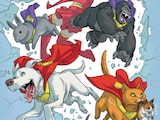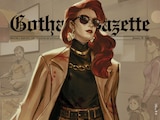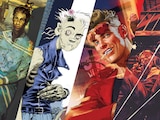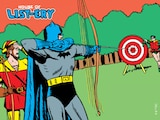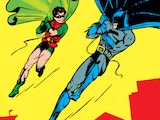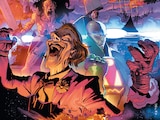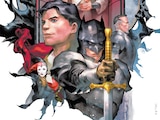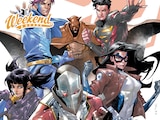Recent high school graduate Lois Lane has a plan. She’s going to move away from her small town, thrive at an illustrious college and become a prize-winning journalist. She just has to get through her internship in National City first—and that’s when the plan begins to fall apart. Can Lois find a way to make things feel right when everything goes wrong?
Girl Taking Over: A Lois Lane Story by Sarah Kuhn and Arielle Jovellanos is a Young Adult graphic novel that introduces readers to an idealistic Lois Lane who thinks she’s got it all figured out. Lois might be in for a few surprises, but author Sarah Kuhn has definitely figured Lois Lane out, as readers of the acclaimed new release are quickly discovering. With AAPI Heritage Month now upon us, we spoke with Kuhn about the most iconic Lois, Margot Kidder, how Girl Taking Over’s Asian American Lois shares some of her own life experiences and much more.

What do you think it is about Lois Lane as a character that makes her so compelling?
I think Miki, Lois’ nemesis-turned-BFF in Girl Taking Over, says it perfectly: it’s about her tenacity, her bravery, her fight. That fight has always drawn me to Lois. She’s passionate about pursuing and exposing the truth, and she never gives up, ever.
I first imprinted on Lois as a kid watching the Christopher Reeve Superman movies, and for me, she was really the protagonist of those films. Margot Kidder was such a force, and Lois simply would never allow herself to be pushed to the side or framed as a mere love interest. She actively drives a lot of the story. I remember being obsessed with the bit at the end of Superman II wherein Lois tells Clark to go get her a hamburger and orange juice at 9 am—I thought that was total goals. Lois will fight for literally everything, including that hamburger.
Does Lois’s journey in Girl Taking Over reflect your own in any way?
Definitely. I’ve said that Lois—one of my first childhood idols—inspired me to become a journalist. Obviously, there was a little more to it than that, but she represented something I very much wanted to be. And I gave her a little of my own story here—I’m also a biracial Japanese American woman who grew up in a very small, very white town and fell in love with the big, bright hustle and bustle of the city. And I also had something like a Life Plan before I learned how to embrace the glorious mess of actual life.

Girl Taking Over is a DC story, but there are no superheroes and National City feels like it’s a city in our universe. Why was it important to you to keep this story grounded?
Well, first I’ll just say that I think stories with superheroes can absolutely be grounded. I’ve read and written many superhero stories that are very much in that vein. To me, “grounded” is more about the authenticity of the characters and their emotional arcs rather than if there are or are not fantastical elements.
In this case, I don’t know if setting this in a non-supernatural contemporary atmosphere was something that we had strong intentions about. We definitely wanted a really strong focus on Lois and her journey, and every choice we made boiled down to what felt right for that. Every choice was all about Lois.
Cat Grant gives Lois Lane maybe the worst pep talk ever. Do you remember the worst advice you’ve ever gotten?
I don’t think it’s that bad of a pep talk—it’s just not the “rah-rah girl power” pep talk Lois was maybe looking for in that moment. It’s Cat presenting her with some awful truths—that the structural, societal deck is always stacked against them as women of color and sometimes it feels impossible to win, or to even fight. She’s trying to protect Lois from some of the things she’s had to experience. And what she says does do the job of pressing Lois toward telling her own truth in a fuller, more unvarnished way.
For me, the worst advice I’ve gotten was probably along the lines of “no one will ever want to buy stories starring Asian American women like you, so don’t even bother writing them.” All of those people were wrong. But as with Lois, that “advice” only made me want to fight harder.

Does Lois’s crush resemble a certain mild-mannered reporter on purpose?
Ha! I don’t think that was intentional, initially, but I certainly noticed it once Arielle started doing her awesome character designs. I guess you can say Lois has a type.
Do you think this Lois, as an Asian American who was othered while growing up, would have even more empathy for the Man of Steel?
That’s an interesting question. I have to say, I never really thought of our Lois in relation to Superman at all. But perhaps she would have more points of connection with him since they are both such outsiders in the communities they’ve grown up in. Maybe that would draw them to each other even more strongly.

What do you hope young readers take away from Girl Taking Over?
I hope young people of color in particular feel empowered to find their voices and express themselves. Part of Lois’ journey in this book is realizing that she doesn’t need to wait around for someone else to deem her story worthy or to give her a platform—she can create that herself. There are so many ways of getting your work and your voice out there these days, and I think that is a beautiful thing.
Girl Taking Over: A Lois Lane Story by Sarah Kuhn and Arielle Jovellanos is now available in bookstores, comic shops, libraries and as a digital graphic novel. Do you live in or around Los Angeles? Be sure to join Sarah, Arielle and colorist Olivia Pecini at the Ripped Bodice in Culver City on May 7th for the Girl Taking Over launch party. Click here for more info!


